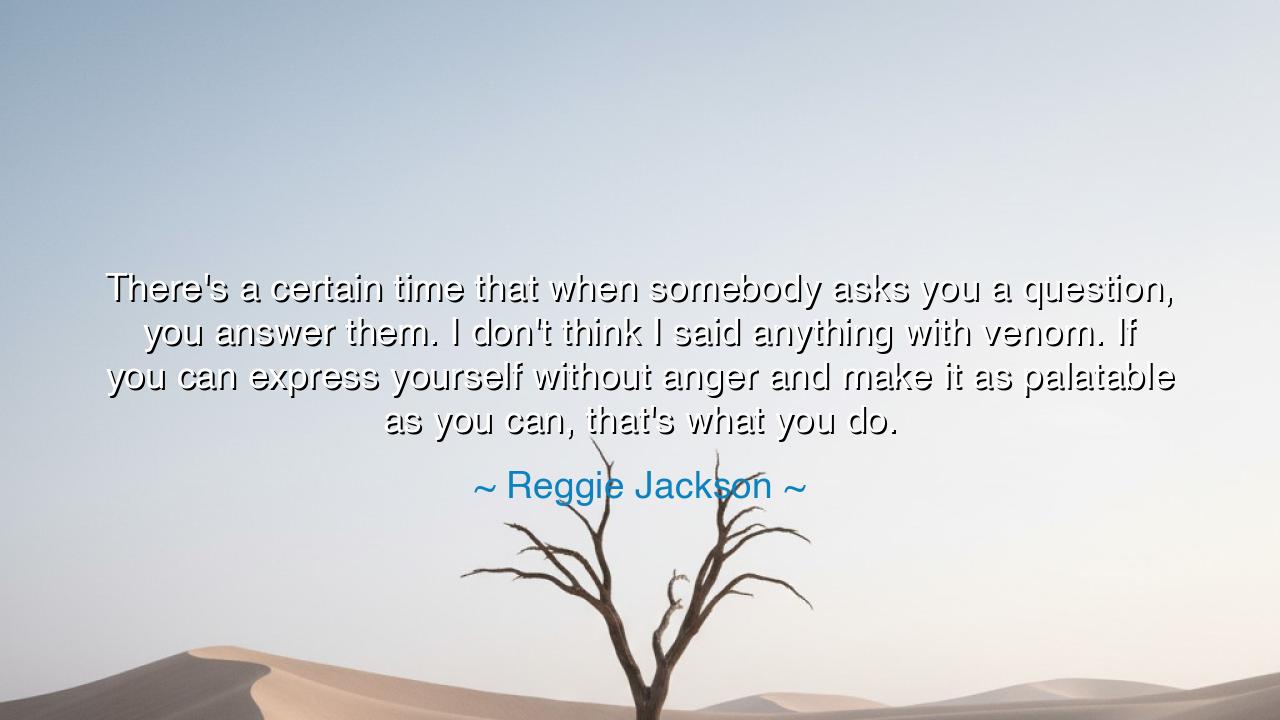
There's a certain time that when somebody asks you a question
There's a certain time that when somebody asks you a question, you answer them. I don't think I said anything with venom. If you can express yourself without anger and make it as palatable as you can, that's what you do.






Host: The evening was calm, the quiet of the room offering a sense of stillness that seemed to match the thoughtfulness of their conversation. Outside, the city had begun to wind down, the hustle and bustle of the day settling into the quiet hum of night. Inside, Jack and Jeeny sat across from one another, the weight of the conversation hanging gently in the air, as if they were both trying to make sense of something that was neither clear nor simple.
Jeeny: (her voice soft, breaking the silence) “Reggie Jackson once said, ‘There’s a certain time that when somebody asks you a question, you answer them. I don’t think I said anything with venom. If you can express yourself without anger and make it as palatable as you can, that’s what you do.’”
(She paused, looking at Jack thoughtfully.) “What do you think he means by that? About expressing yourself without anger?”
Jack: (looking down for a moment, his voice quiet but introspective) “I think he’s talking about control. The ability to respond, not react. To answer thoughtfully, even when the question might be something difficult, even when emotions might be running high. It’s about taking the time to pause before responding — instead of letting anger take over.”
Jeeny: (nodding slowly, her voice steady) “Exactly. And it’s not about suppressing how you feel, or pretending that the anger isn’t there. It’s about choosing to express yourself in a way that doesn’t escalate the situation. It’s about owning your response and making sure it’s clear, not clouded by emotion.”
Jack: (reflecting, his voice more contemplative) “It’s tough though, isn’t it? When you feel that anger or frustration bubbling up, it can be hard to stay calm. Especially when you feel like you’ve been wronged or misunderstood. But maybe that’s when it matters most. When you respond without anger, you not only protect yourself, but you make the conversation productive.”
Jeeny: (her expression softening, her voice quieter now) “Yes. Because when you speak from a place of calm, your words carry more weight. They come from a place of understanding, not defensiveness. And even if the other person doesn’t agree with you, they’re more likely to listen.”
Jack: (smiling faintly, his voice more resolved) “I think that’s something I’ve learned over time. It’s easy to get caught up in the heat of the moment, to let your emotions lead. But when you can step back, breathe, and answer with clarity — that’s when the real conversation happens. You’re not just reacting. You’re communicating.”
Host: The room seemed to fill with an unspoken understanding, the quiet exchange of thoughts making the space feel warm. The weight of Jackson’s words was clear: response over reaction, clarity over confusion, calm over chaos. The idea that even in moments of tension, there was always a choice — a choice to rise above the anger and speak with purpose, with intent.
Jeeny: (smiling softly, her tone encouraging) “It’s a practice, though, right? To speak without anger. To make sure that when you do respond, your words aren’t laced with resentment or frustration. It takes awareness, and patience.”
Jack: (nodding, a small smile on his lips) “Yeah, it does. But it’s worth it. Because when you do express yourself clearly, without anger, you give others the space to respond in the same way. And that’s when real communication happens. Not just a back-and-forth of emotions, but a genuine exchange of ideas.”
Jeeny: (gently, almost whispering) “And in the end, it’s not about winning the conversation. It’s about understanding, about creating space for both sides to speak and be heard.”
Host: The silence between them wasn’t heavy; it was comfortable, filled with the quiet realization that communication, at its best, was about more than just words. It was about how you said those words, the intent behind them, and the space they created for mutual understanding.
Jack: (softly, almost as if reaffirming something to himself) “Maybe the best conversations are the ones where you don’t have to fight to be heard. Where you can speak calmly, and the other person does the same.”
Jeeny: (smiling warmly, her voice calm) “Exactly. And when you speak without anger, your message is stronger. People listen more closely when they don’t feel threatened or defensive.”
Host: The moment lingered between them, the quiet of the room wrapping around their conversation like a comfortable blanket. The world outside continued its rhythm, the night deepening, but inside, the truth of Reggie Jackson’s words had found a place to settle — that the art of communication was as much about how you spoke as it was about what you said.
And in that simple understanding, the power of a calm, thoughtful response became clear. Not just in moments of tension, but in every conversation, every exchange. The ability to answer without anger, to express yourself with clarity, could be the key to deeper understanding and stronger connections.






AAdministratorAdministrator
Welcome, honored guests. Please leave a comment, we will respond soon